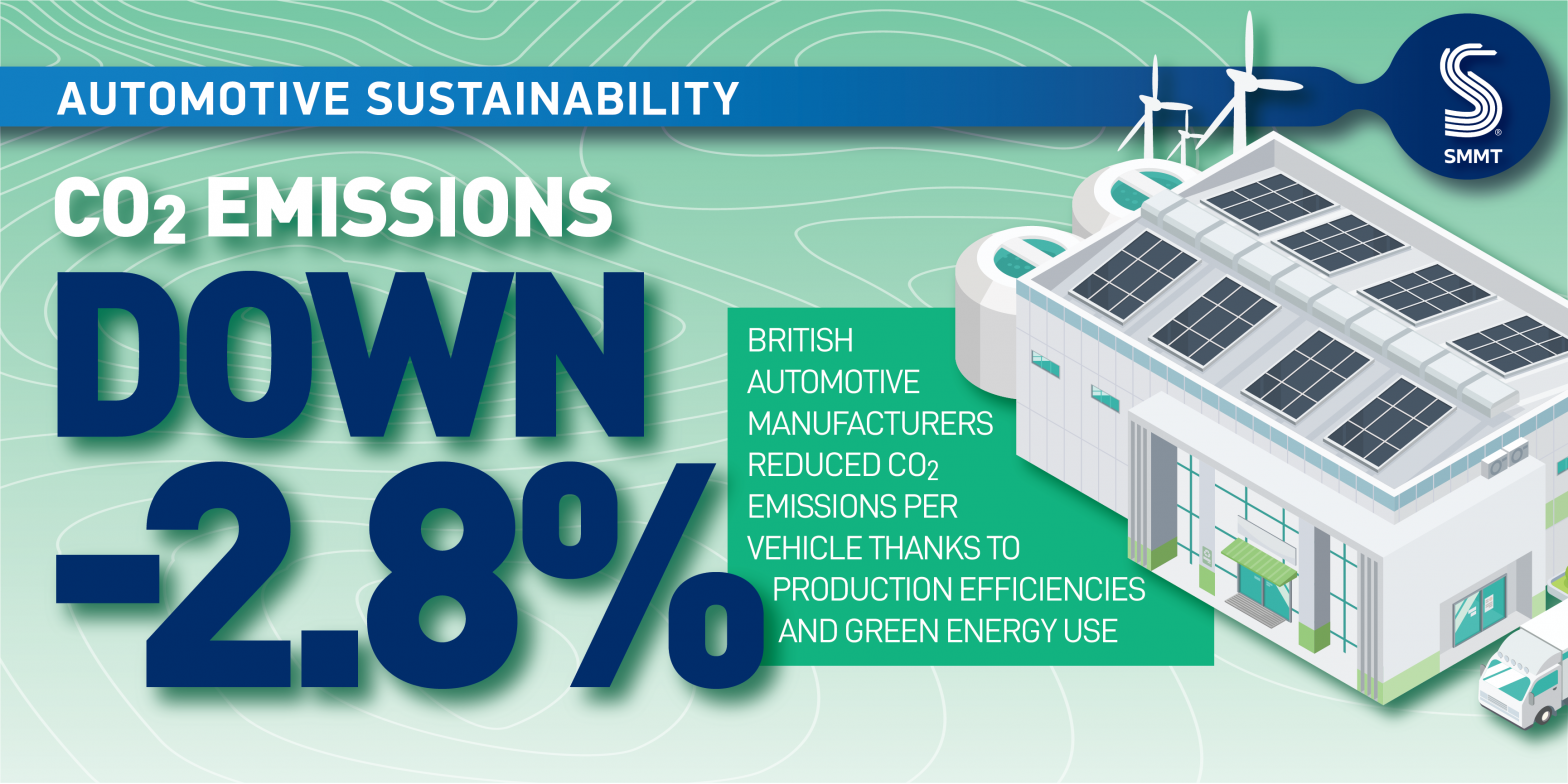- British automotive manufacturing plants reduce CO2 emissions by -2.8% to deliver lowest carbon footprint on record.
- Electrified vehicles reach record levels of output as investment in low carbon production delivers more ultra-low and zero emission vehicles to UK roads.
- Renewable energy generated by manufacturers reaches 46GWh – enough to produce up to 767,000 electric vehicle batteries a year – but wider investment is key to long-term green goals.


UK automotive manufacturers have shrunk the carbon footprint of production to its lowest level on record, reducing emissions per vehicle made last year by -2.8% – while at the same time producing a record-high proportion of electrified vehicles (EVs), according to the latest annual Sustainability Report by the Society of Motor Manufacturers and Traders (SMMT).
The new research, published today, shows that the UK auto sector is continuing its commitment to Britain’s world-leading net zero targets. While electric vehicles require more energy to produce, manufacturers have been able to advance the carbon efficiencies of production, with 2022 CO2 output down by nearly 17,700 tonnes – the equivalent annual carbon reduction of more than 800,000 trees.1
The savings were delivered in part by growth in green tariff energy use, while manufacturers themselves generated some 4.7% more renewable energy than last year thanks to continued investment in on-site green infrastructure, delivering a total of 46GWh – enough to produce up to 767,000 EV batteries a year.2


While Britain is scaling up its EV output, battery production is lagging behind, with up to 90GWh of gigafactory capacity needed by 2030 to meet the UK’s EV manufacturing needs.3 With a number of factors affecting investment decisions, involving many stakeholders, SMMT has set out an industrial plan that calls for a range of measures, including major investment in more affordable, renewable energy supply in the UK, in order to keep a greener British economy and society on the move.
The UK is in a strong position, having manufactured a record number of electrified cars last year – a third (30.2%) of all cars made in British factories during 2022. Demand for electrified vehicles in particular means that the average CO2 tailpipe emissions of new cars fell by -6.9%. At the same time, manufacturers further streamlined their recycling and reuse, with the average amount of waste per vehicle down by more than a third (-37.0%).


Since Europe’s first mass market EV entered production in the UK in 2011, manufacturers have allocated some £11 billion in long-term commitments to deliver zero emission vehicles and decarbonise production facilities. The sector’s historic excellence, combined with its highly skilled workforce and undoubted R&D capability, can help make it one of the top global locations for producing zero emission vehicles. However, against a backdrop of increasingly fierce competition for investment and the need for industrial security provided by domestic battery production capacity, Britain urgently needs a plan to grow its supply of low cost, low carbon energy. This is essential not just for manufacturing competitiveness but also for EV drivers, who must be confident that they can cost-effectively charge an EV with green energy – a vital step to accelerating uptake.
Mike Hawes, SMMT Chief Executive, said,
Britain’s automotive industry is building record numbers of zero emission vehicles while cutting its carbon footprint to a record low. This double success has been delivered thanks to huge investments from manufacturers to decarbonise both their facilities and vehicles. As demand for electric vehicles continues to grow at home and overseas, the UK can distinguish itself as a low-carbon manufacturing nation – but this depends on critical investment in gigafactories and the affordable, renewable energy needed to power them. The sector has made huge strides in recent years but there is much more to be done.


Recent sustainability investments in auto manufacturing, included in today’s Sustainability Report, range from green technology innovations to solar panel sites and production efficiencies:
- JLR: JLR is developing a portable zero emission energy storage unit, known as the Off Grid Battery Energy Storage System, powered by second-life Jaguar I-PACE batteries that can supply green energy in response to limited mains supply.
- Bentley Motors: Bentley is supporting its retailer network to embed sustainable practices within their operations, as part of its Beyond 100 strategy to ensure 100% of its global retailers are carbon neutral by 2025.
- Alexander Dennis: The Scottish bus manufacturer formed a cross-functional Energy Governance Committee in 2022, which is meeting monthly to successfully deliver more efficient energy use and further energy reductions.
- Michelin: In a world first, Michelin has unveiled two new tyres for cars and buses with 45% and 58% of sustainable materials respectively. The tyres have performance levels that match Michelin’s conventional tyres.
- Unipart: Solar panels fitted to its Worcestershire logistics warehouse are expected to generate around 46,000kWh of electricity per year – enough energy to run the site while feeding back into the grid.
- Leyland Trucks: 20 electric DAF trucks were put into operation with public services last year, including the NHS and local authorities, in one of the largest deployments of its kind, as part of the Battery Electric Truck Trial.
- Scania: The Eurocentral site, which enables the servicing of Scania’s conventionally fuelled and electrified trucks, has been futureproofed with the installation of 950kVA of power on site – more than a third of which has been allocated to truck charging infrastructure.
Notes to editors
1 European Environment Agency, Key facts: Trees help tackle climate change, 2012.
2 A 46GWh capacity battery production facility could manufacture batteries for between 511,000 and 767,000 BEVs, depending on average battery size.
3 Current UK gigafactory capacity is 2GWh. Race to Zero: Powering Up Britain’s EV Supply Chain.
